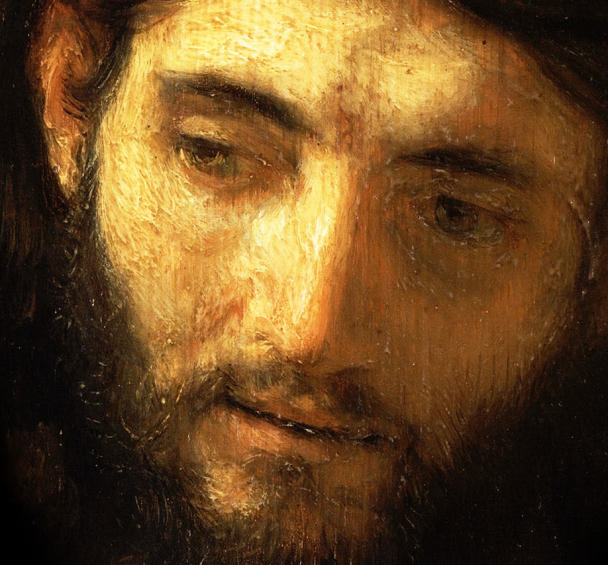The Mercy of God in the Face of His Christ
The Voice of Mercy
While we are yet on the threshold of Lent, Christ Jesus, the incarnate Mercy of God, passes by, looks into our hearts, sees every bit of your story and of mine, and, astonishingly, says, “Follow me” (Lk 5:27). Jesus wants us for Himself. “I have not come to call the righteous, but sinners to repentance” (Lk 5:32).
Saint Augustine
We do well to attend to the traditional Lenten Stational Churches of Rome. An authentically liturgical piety is shaped by the practices of the Church that is at Rome. The best peoples’ missals used to offer a map of the Eternal City marking the location of the Stational Churches so that, at least in spirit, Catholics the world over could follow the Christians of Rome in their Lenten progress. Every day in Lent offers us the opportunity to make a spiritual pilgrimage to the designated Stational Church. I speak of this because today’s church, that of Saint Augustine, is the key to singing today’s Introit with understanding: “The Lord hath heard, and hath had mercy on me”. The Confessions of Saint Augustine are confessions of the Mercy of God. “Though I am but dust and ashes,” says Augustine, “allow me to speak in Thy merciful presence, for it is to Thy Mercy that I address myself” (Confessions, Book I, 7).
Mercy on the Face of Christ
The richness of God’s Mercy is revealed in Jesus. We see the Mercy of God on His face. We hear the Mercy of God in His voice. We feel it in the touch of His hands. We experience it flowing from His heart. Christ, being the Mercy of God, is the Way to those who, confused and disoriented, have lost their way in life. Being the Mercy of God, He is the Truth to those who go stumbling in the darkness and knocking at all the wrong doors, hoping to find truth at home. Being the Mercy of God, He is the Life to those cruelly deceived by a culture of death.
The Compass of Divine Mercy
Repentance is born of one’s encounter with the Mercy of God in Christ. The tradition of the Church — a tradition distilled from the experience of the saints — offers us a compass that unfailingly points to the Mercy of God. Repentance is a habitual reference to this compass of Mercy, obliging me again and again to adjust the direction of my life.
Late Have I Loved Thee
Repentance has little to do with looking at oneself, and everything to do with gazing upon the beauty of God. ”Look to Him and be radiant,” says the psalmist (Psalm 33:6). Repentance dissolves all thought of oneself in the “light of the knowledge of the glory of God in the face of Christ” (2 Corinthians 4:6). The repentant soul wastes no time dwelling on her sins. Sin is ugly and, in the end, frightfully boring. The repentant soul is magnetized by the beauty that shines in the Face of Christ. Repentance brings forth tears, it is true, but these are the tears of astonishment shed by a Saint Augustine: “Late have I loved thee, beauty so old and so new, late have I loved thee!” (Confessions X, 38), the tears of a Saint Scholastica overwhelmed by the Love that, “being perfect, drives out all fear” (Rule of Saint Benedict 7:38).
Eucharistic Mercy
The repeated re-orientation of ourselves by the sacred liturgy compels us to do away with “the yoke, the pointing of the finger, and speaking wickedness” (Is 58:9). It is at the Table of the Divine Hospitality, in the Holy Sacrifice of the Mass, that we learn the meaning of the prophet’s words, “pour yourself out for the hungry and satisfy the desire of the afflicted” (Is 58:10). What is the Most Holy Eucharist, if not Jesus “pouring himself out for the hungry” and, with the mysteries of His Body and Blood, “satisfying the desire of the afflicted”?
The Company of Mercy
The feast given by Levi in his house, amidst a large company of tax collectors and others sitting at table with Jesus, was but a pale image of the greater feast made ready for a company of sinners too many to be numbered: the banquet of Mercy at the table of the kingdom. The hospitality of God is lavish and, with jubilant angels in attendance, the Church has, here and now, opened wide the doors of the divine hostelry. Draw near to the altar of the Holy Sacrifice. Pay no heed to those who murmur against you. It pleases Mercy to eat and drink with repentant sinners. Even more, it has pleased Mercy to become both food and drink for the poor sinners whom He has drawn to His Heart. “O taste and see” (Psalm 33:8).

